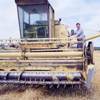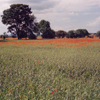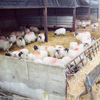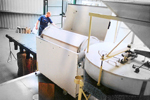

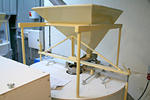
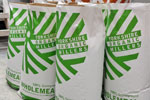
'Little Bit of Bread and No Cheese
The Self Sufficiency and Sustainability of our Bread
The best crops of bread-making wheat are usually grown in deep silt or clay rich soils. Those soils are a precious resource and particularly so in a well-populated nation like the UK.
Currently, 85% of the best quality land in the UK, is used to grow crops that feed animals. Only the remaining 15% of that land is sown with 'milling' varieties, from which we make bread. From that 15%, an astonishing 75% of all our bread and biscuits are produced.
Remarkable though these statistics are, the very high yields of grain per hectare (upon which they depend), carry a huge carbon footprint: they are entirely thanks to the application of oil-derived fertilisers and pesticides. Meanwhile, we choose to import (unsustainably and unnecessarily) 25% of our bread quality wheat from Canada and distant corners of Europe.
Bread and nature are two of the most vital ingredients in our lives, so they both need our care and attention. If we really thought about it, we would immediately incentivise our farmers to adopt cyclical, organically certified or 'regenerative' farming. Why ? Because without the use of any artificial fertiliser or pesticides, the UK could be caring for its wildlife and still grow an ample sufficiency of milling grain to feed ourselves. We could regulate the amount of our best land given to crops for feeding animals and double the area sown with milling varieties from 15% to around 45%. That would still leave plenty of grain grown for a reduced number of our intensively reared animals.
Today, our farmers have a knowledge of soils, plants and fertility-building rotations that is way ahead of anything understood in the 1950's. In particular, we now know that if plants are 'spoilt' by easily accessing artificial fertilisers, they do not develop strong, nutrient-seeking or drought resistant root systems. We also know that those fertilisers and pesticides actively harm the vital health of worms and Mycorrhizal fungi in our soils.
Today, nobody can justifiably say that fully-regenerative, organic systems are not the best way forward for both farmers and the society they feed. We have already transformed the efficiency with which we grow grain, thanks to new precision drills and other new cultivating and weeding machines. We have also understood a huge amount about fertility-building break crops. Now is surely time for government ministers to introduce serious incentives to remove our dependence on oil-based fertilisers and pesticides.
In the long term, sustainability is about reducing the carbon we put into the atmosphere and the concept of Tradable Energy Quotas (2) is the fairest, if not the only way forward*. The necessity of applying carbon quotas to farming, transport and all other aspects of our daily lives, could not be clearer. At the same time, finding an immediate and fair way of administering such a scheme presents us with one of the most significant challenges of all time. We need to prioritise that work immediately.
[(1) These statistics are taken from the ‘UK Flour Millers’ website and the recorded sales of conventional and organic wheat seed in UK.
[(2) As explained by David Fleming]
Grain Pricing
At Yorkshire Organic Millers, we are determined to find ways to ensure organic farmers are paid a proper price for their milling grain; that has to be a price which reflects the risks and true costs of growing it. In other words our farmers need to be rewarded with a far greater degree of reassurance and protection.
Today, UK prices can rise or fall dramatically in a market which is subject to competition from all parts of the globe; a few ship loads of grain from say, Kazakhstan, Russia or Canada, and prices can drop by £20--£40 a ton. This does not encourage self-sufficiency or a sustainable future.
Meanwhile our specialist growers, manufacturers and retailers compete to supply the whole of the UK. We live in a country in which small numbers of large and specialist farms provide most of the grown goods to increasingly few supermarket outlets. For example, around 90% of the UK's vegetables will be grown by a few farms which have invested heavily in specialist machinery. The vegetables they produce are then sold to supermarkets at prices which do little more than service their debts. This is a repeated pattern, during which multiple opportunities to build more circular, local and sustainable economies, are ignored. The lesser scaled activities of smaller producers, communities and towns, are treated as though they simply didn’t matter. We live in a time when 'efficiency of production' is foolishly considered to be the only certain sign of progress.
Currently the average price of the UK's organically grown milling grain has been lowered by the availability of imported grains from Russia and elsewhere. At Yorkshire Organic Millers we are offering the UK's organic farmers a price that is £140 per ton higher than that of 'conventionally produced' grain. That is quite some premium and a reflection of a wide section of our public choosing to buy bread without any traces of weed-killer in it. Now is surely the time to encourage a new set of values, pioneered by our organic farmers, millers and bakers. It is also time for our government (and the Competition Marketing Authority) to encourage sustainable changes to the way we grow, buy and sell our precious crops of milling wheat.
We need to include local communities in the development of much fairer, less polluting ways of living and working. Reference to the 1947 Agricultural Act, would be a useful start
The Assizes of Bread and Ale
One hundred and seventy years ago the UK had measures in place to promote fairness and sustainability in our local economies. The protective procedures of the Assizes of Bread & Ale were in operation from the middle ages until 1846, when the Corn Laws were repealed and imports of tariff-free wheat were allowed. This huge change obscured the principle aim of the Assizes of Bread, which was to manage prices at a local level, so that farmers, millers, bakers and consumers all got a fair 'crack of the whip' (to eat, work & live). To achieve this, local mayors were entrusted with the task of naming the price that was to be paid to farmers for any milling grain grown within or imported into, their districts. After receiving reports of the latest grain harvest, mayors would obtain information from local market traders and arrive at an average price being offered. Using this information, they would then decide on a fair exchange price for grain, which was often just above the average price of a good grain sample. This system directly linked the grain price paid to farmers with the weight and value of bread sold in that district. It is interesting to note that the Assizes continued to operate in Oxford, twenty years after the repeal of the corn laws (until 1865). Could there have been something mutually beneficial about the Assize laws ?
Without the 21st century communications that are now available to us, the Assize laws weren't always popular and many of the bakers objected to being controlled by the mayor's men from 'weights and measures'. On the other hand, why would anyone question the importance of work that ensured the good value and quality of such a vital product ? Didn’t the Assize laws enable mayors to keep an eye on the functioning of their local economies in a way that was both socially responsible and democratic ? If we compare those laws to the free-for-all of our free-market in which the inequalities of landscape, climate, culture and development get little or no consideration, they were definitely allied to a better sense of direction and purpose.
Such is our current faith in the market being the only way to manage our food economies, any thought of re-introducing the Assizes of Bread and Ale in it's original form, is likely to be met by political blockade. On the other hand, now that the urgency of sustainability and climate matters are foremost in our minds, there must be something to be learned from the fair minded aims at the heart of the Assize laws ? What might the best parts of the ‘Assizes of Bread’ teach us ? Isn't this the moment for fairer, minimum pricing ? Fairer to our countless communities and trades... and above all, fairer to the planet. There seems to be a lot of research-space here for someone with a good mind, computer skills and an interest in the resilience of our national food supply.
The Wildlife Tragedy needs to be reversed
Back in the 1950's, hedgerow birds were so numerous that they consumed a considerable quantity of grain from the boundary edges of a farmer’s crop; that is why in the 1960's, farmers removed so many of our hedges and trees near arable fields. Today the numbers of small and large birds have been pitifully reduced and several species are on the brink of being lost in the UK. Some would say that the farmer has finally got his revenge by applying his insecticides and other chemicals, but in reality, the true cause is the small value that consumers give to their food. It is the competitive pricing on our supermarket shelves that does the killing. Minimal prices not only remove wildlife (by committing us to short-term farming) but also farmers, who have been reduced to suicide at a rate of one death per week. It is time for us to face these facts and at the very least, reconsider the effects of low pricing for essential food products such as bread. Both nationally and internationally.
The term 'pesticides' includes fungicides, insecticides, rodenticides, molluscicides and herbicides; these are poisons which not only kill their targets directly, but also kill indirectly when other wildlife consume the poisoned slug, snail, insect or rodent. Slug pellets, which are often spread on newly sown crops of winter wheat (following oilseed rape), are a good example. They are not only toxic to the targeted snails and slugs, but to the small rodents who eat them, which in turn, are eaten by owls and hawks.
Glyphosate (the main constituent of 'Round-up') is another secondary killer currently used by most farmers to eliminate all green growth before and after crops have been harvested. This annually repeated spraying turns huge areas of farmland into grey, lifeless zones during the winter months. Post-harvest fields once provided a green environment for beetles and small rodents, who in turn were consumed by our small birds and raptors. Now that such a huge and harmless source of wild-life food is constantly removed, is it any wonder that our birds are disappearing ?
